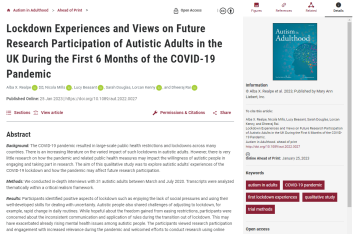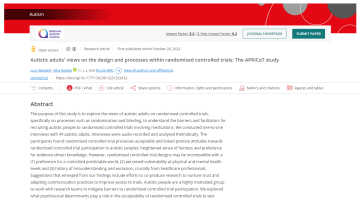Adapting trial methods for neurodiverse populations
Theme Mental health
Workstream Biological interventions, trial recruitment and safety
Status: This project is ongoing
The aim of this project is to understand how we can involve people with neurodevelopmental conditions in randomised control trials. A randomised control trial is a study in which people are randomly assigned to two (or more) groups to test a specific drug, treatment or other intervention. The new intervention is only tested in one group while the other group is given an alternative intervention, a dummy intervention (placebo) or no intervention at all.
People with neurodevelopmental conditions, such as autism, have historically been seen as hard to recruit for trials despite their extensive health needs. We want to change this by working with the autistic community to develop evidence and resources that will help us design and conduct trials in this population. This will include work on how we can recruit and retain neurodiverse people throughout the trial process.
We will gather evidence and interview teams from previous trials to identify barriers and challenges to recruitment. Our aim is to develop a framework of good practice which makes it possible to successfully recruit people with neurodevelopmental conditions for randomised control trials.
Our work so far – APRiCoT study
During the Autistic Adults and Randomised Controlled Trials (APRiCoT) study we interviewed 49 autistic adults without learning disabilities. We wanted to understand how autistic people felt about randomisation and other clinical trial components. Understanding this will help us identify potential barriers and facilitators to recruiting trial participants from this group.
Our interviewees reported being highly motivated to participate in research. They believed taking part in research was a moral obligation because it was the right thing to do. They also saw its potential to directly benefit their community in areas such as mental health, where not much research into effective treatments has been done.
Participants saw added value in including autistic people in decision-making at all stages of the research process, from generating research questions to the dissemination of findings. They felt that developing and conducting research in close collaboration with the autistic community would help to establish trust. They also suggested that adapting communication and being flexible about how participants kept in touch with researchers throughout the study could provide improved access for the autistic community.
During interviews, participants listed some of their concerns about taking part in research. These included:
- Their preference for a controlled and predictable world and how the uncertainty associated with trial design would affect their daily lives
- A distrust of healthcare professionals and medical research developed because of negative past experiences
- Potential barriers to communication between themselves and research teams

Lockdown Experiences and Views on Future Research Participation of Autistic Adults in the UK During the First 6 Months of the COVID-19 Pandemic
